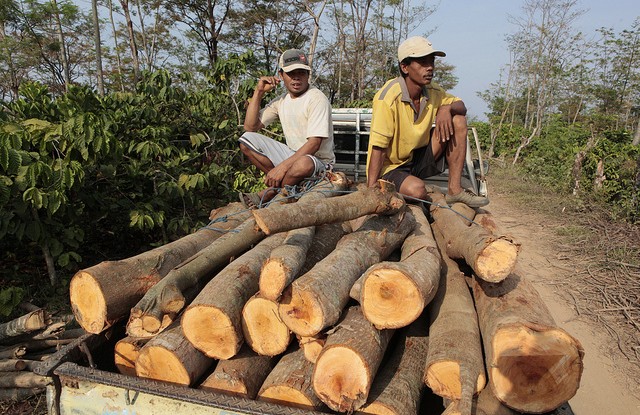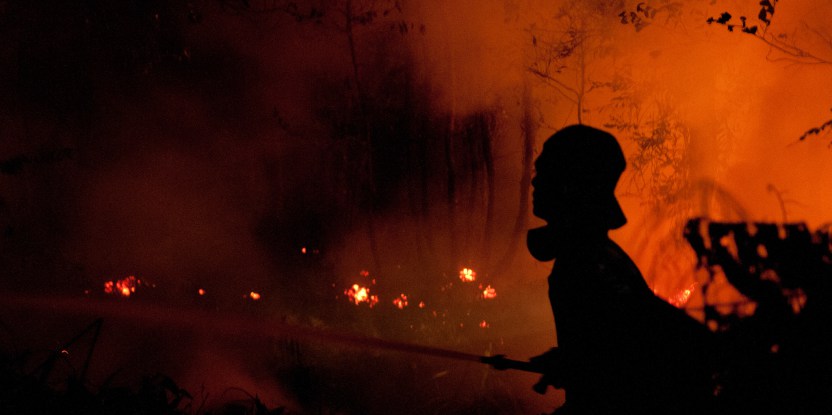
Like many areas in Indonesia, the Regency of Berau in East Kalimantan is rich in natural resources. So naturally, development in the region is accelerating at breakneck pace.
Every day, coal trucks weave their way from open pit mines to fill open barges for shipping. Land is being cleared to make way for rows of oil palms. As a result, deforestation rates since 2000 have almost doubled (from 12,833 ha in 2000 to 20,760 ha in 2012).
Fifteen years ago, its regional airport was nothing more than a single runway shared by itinerant goats and locals who would use the tarmac to practice driving.
But today, passengers are welcomed by a multi-story steel, glass and chrome building—a testament to the national government’s regional development plan, in which Berau is touted as a future major coal and gas source.
Yet despite these changes, 75 percent of Berau’s 2.2 million hectares still consists of primary and secondary forests. These forests are home to one of the largest orangutan populations in the world, as well as to 80 threatened tree species.
Effective management of these forests is still in its infancy. Regulations are rarely enforced, which means that the small-scale loggers are still considered ‘illegal’, according to the law.
But now, their activities might no longer go unnoticed.
Tracking Timber
In 2009, the central government issued timber certification regulations that could finally reach these forests and impact the timber industries that use them.
The Indonesian Timber Legality Verification System, locally known as the Sistem Verifikasi Legalistas Kayu (SLVK), is a national law that requires all timber producers across Indonesia to be certified. This means that all timber suppliers must pay for registration and undergo audits to prove that their timber is sourced legally. The SVLK was supposed to take force in 2012, but uptake by local and provincial governments has been slow.
The district government of Berau is now trying to change that.
The first stage of policy development by the government has been to seek input from stakeholders and experts—to share their knowledge and policy recommendations.
“We don’t want our people to be accused of violating the law and face charges due to a lack of legal knowledge,” said Syarifatul Syadiah, Head of Berau Regency.
Recently, a team of CIFOR scientists traveled to Kalimantan, Indonesia, to attend a government hearing to help local authorities design new regulations suited to the local timber industry.
The researchers had previously studied the impact of timber legality verification on small-scale enterprises as part of the ProFormal project. The project compared issues of timber legality verification for small-scale enterprises across five countries, of which Indonesia was one.
“We welcome the opportunity to contribute to the local policy-making process in the forestry sector, particularly in Indonesia where local governments may lack the resources they need to have a solid knowledge base for decision-making,” said Kyrstof Obidzinski, the study’s lead author. Obidzinski was working for CIFOR at the time, but is now with Wood & Wayside International, Inc. based in Bogor, Indonesia.
“If Berau is to see the same level of growth as it has in the past 15 years, the way these regulations play out could have a real impact. But achieving industry-wide compliance is not going to be easy,” he said.
Enforcing certification is difficult because most of these small operators do not meet basic business legal requirements.
Illegal logging looms large
The informal timber sector in Berau consists of about one thousand people in 175 small-scale logging groups, locally known as pembalak, which are distributed all over the forests in the Berau regency.
These pembalak supply the local markets with illegally sourced, cheap timber.
“Enforcing certification is difficult because most of these small operators do not meet basic business legal requirements,” said Heru Komarudin, a CIFOR scientist who also worked on the project.
Dody Hernawan, a researcher for CIFOR, estimates that over 90 percent of the timber used in the domestic market is from the informal logging sector, rendering it illegal.
On top of that, certification increases the operation costs for small-scale loggers, which raises the cost of timber—effecting the affordability and supply of timber for local production.
To shift the status quo, the Berau Regency Government is formulating new regulations to increase certification, particularly those aimed at informal suppliers.
“As policymakers, we support legalization because it contributes to the government’s revenue and reduces the ability of people to collect bribes,” said Syadiah.
Yet Syadiah is also aware of the difficulties that lie ahead. “This law is part of a long process—there aren’t any instant results because eliminating such habits is no walk in the park.”
We want you to share Forests News content, which is licensed under Creative Commons Attribution-NonCommercial-ShareAlike 4.0 International (CC BY-NC-SA 4.0). This means you are free to redistribute our material for non-commercial purposes. All we ask is that you give Forests News appropriate credit and link to the original Forests News content, indicate if changes were made, and distribute your contributions under the same Creative Commons license. You must notify Forests News if you repost, reprint or reuse our materials by contacting forestsnews@cifor-icraf.org.
